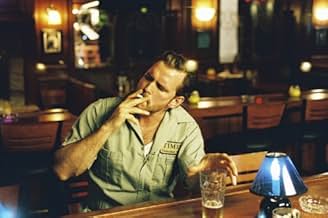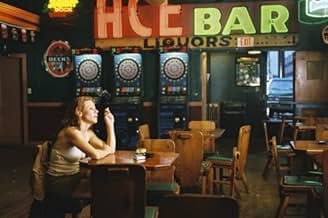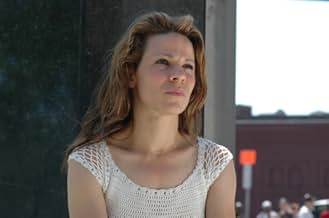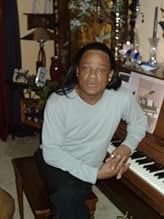Ajouter une intrigue dans votre langueThis drama centers on Hank Chinaski, the fictional alter-ego of "Factotum" author Charles Bukowski, who wanders around Los Angeles, CA trying to live off jobs which don't interfere with his ... Tout lireThis drama centers on Hank Chinaski, the fictional alter-ego of "Factotum" author Charles Bukowski, who wanders around Los Angeles, CA trying to live off jobs which don't interfere with his primary interest, which is writing. Along the way, he fends off the distractions offered b... Tout lireThis drama centers on Hank Chinaski, the fictional alter-ego of "Factotum" author Charles Bukowski, who wanders around Los Angeles, CA trying to live off jobs which don't interfere with his primary interest, which is writing. Along the way, he fends off the distractions offered by women, drinking and gambling.
- Réalisation
- Scénario
- Casting principal
- Récompenses
- 4 victoires et 5 nominations au total
- Tony Endicott
- (as Tom Lyons)
- Stripper
- (as Emily 'Sophia Simone' Hynnek)
Avis à la une
The dialog has lots of pop. Somewhat a film noir, somewhat a comic book, the film has a nice feel with the first person narration of Chinaski taking us on his tour. It could have been in black and white but is nicely filmed in color. One of those slightly rare movies as at home at a film festival (Cleveland's, in this case) or at your local theater.
Essentially, this film is about the despairs of alcoholism, frighteningly brought to life by an array of simply stunning performances. Matt Dillon as Henry Chinasky is literally sweating alcohol. His face is red and swollen, he looks absolutely horrible. Once handsome but now an absolute has-been, who's sole interests are booze, gambling, sex and writing. People don't interest him at all, including the women, sex is all that interests him, if only mildly. Lily Taylor is a perfect match as his female interest and fellow barfly. But the real kudos are for Marisa Tomei in a relatively minor role but she really burns off the screen, alcohol set on fire. A real treat.
It might not be a typical Bukowski-movie, in the sense of his sometimes brash, aggressive, perhaps even typical direct American style, so fans of his work might judge this movie very differently and perhaps argue this is not the real spirit of Bukowsky put to the screen. But director Hamer handles it with such warmth, humor, sly wit and at times very sharp observations that you really shouldn't care about this. Judge it on its own merits.
Camera Obscura --- 9/10
Hank, like Bukowska is a dedicated alcoholic drifting indifferently through any odd jobs he can con his way into then disdainfully neglect until he is inevitably 'canned', spend the pay-off on booze and then ricochet randomly off to repeat the process elsewhere. It is as if, like the theory, through his alcoholic haze Hank sometimes has an idea of where he's going but isn't really clear where he actually is. Alternatively he sometimes has sense of where he is, but none at all of where he's going. Like a particle with no discernible fixed identity, he bounces randomly around the world colliding with people, places and events of which he is part, but in which he makes no stable intentional intervention and to which he displays no discernible interest. This process is constantly re-fuelled by a 24/7 intake of alcohol and nicotine. If this sounds incredible then we should remember that the real Bukowska's body survived this punishing regime for 74 years until his death in 1994.
If this were all, then Norwegian Director Bent Hamer's film would not be the absorbing work that it is. For through this fog of alcohol shines the dim light of Hank's determination to write. Not in the least for its rewards or recognition, but because it forms the nucleus of his fragile identity. And through the excellent use of Hank as narrator, the stark, clinical, austere quality of Bukowski's writing emerges. This is the poetry of skid row, the unsentimental, unflinching account of life at the margins of normal society about which Hank is entirely indifferent and Bukowsa himself viewed with contempt. There is a brief, doomed, flirtation with the idea that we might have some control over our destiny through Hank's initially successful foray into betting the horses. Racing I guess offers the illusion that even if God plays with dice, with a bit of determined effort a man might beat the odds. Of course this ends in failure - the house always wins in the end.
The paradox of quantum theory is that the precise and rigorous lucidity of the language of science, expresses a view of the world of matter that is devoid of certainty and inherently rests upon mere probabilities. Similarly Hank's island of lucidity is the drive to write; to create a meaningful response to a meaningless world. His behaviour is as random and unpredictable as the chaotic, senseless events of the world that provoke it. Yet an urge to coherence emerges through his irresistible drive to write about that world. He has simple appetites: alcohol, nicotine and sex and no moral, emotional scruple gets in the way of satisfying them. He is drawn into transitory friendships and fragile sexual relationships by the basic need to drink, smoke and have sex. The only relationship he has with any semblance of continuity and personal satisfaction is with fellow alcoholic Jan.They share these basics needs and arrive at a kind a stable modus vivendi where they are fully met without having to wander about the world hoping to pick them up in a run down bar. Jan's predilection for leaping into bed with every random bum she takes a fancy to, the dirtier the better, eventually fractures this sex-of-convenience arrangement. Here Hank packs his bag and leaves with the air of a guy popping out for a night's bowling rather than walking away from the only half-way stable relationship he's ever had. This fictional account mirrors Bukowska's own 10 year relationship with Janet Cooney-Baker also a long-term alcoholic who eventually lost her fight with the booze in 1962.
Hank lives in a down-beat, dead-beat world where his holy trinity of physical appetites are the only distraction from that world to which he is always, by choice, an outsider. The film is visually and aurally dark in tone. Yet through this, Hamer's screenplay, leaning I suspect heavily on Bukowska's own writing, cuts clinically and strikingly like a surgeon's knife making an incision to open up to the unflinching eye, the diseased or damaged part of life that may need surgical repair or excision. This is writing honed to a razor-sharp edge that is simply startling and despite inducing a sense of recoil, exercises a strange fascination. If I have a regret, it is that more might have been made of the occasional moments of darkly ironic humour flashing like flinty sparks out of the sheer absurdity of the many irredeemably hopeless situations Hank stumbles into. I don't now Bukowska's work but occasionally in this film Hank's blurred perspective seems to be a weary "so what?" in response to the world: at others there is a flash of rebellion that engages us much more.If there is much of Hank Chinaski to like we find it here.
Matt Dillon is a revelation and has never for my money done anything remotely in this league before. Lili Taylor is equally convincing as bed and bottle-mate Jan and even manages to tease a kind of pathetic tenderness out of the role. Marisa Tomei is effective as one of Hank's random, ricochet lays who is locked into a very weird foursome with two female friends and an older man who manipulates sex from all three by funding their booze and basic needs.
Factotum is no nice night out at the movies. Its darkness is as heavy as it context would imply. Yet it is constantly absorbing and thought-provoking. It is immensely successful in portraying the world and experience of an autobiographical character based upon a writer both Jean Genet and Jean-Paul Sartre called "America's greatest poet" This 'factotum', jack-of-all-trades, late in his writing life, by all accounts became master of one. Off-the-wall, in-the-gutter but cinematically on-the-money.
Zettel
He drinks, smokes, womanizes :), and writes all the time. His writing (much like Charles Bukowski's, the author of the book this movie is based on, dead in 1994 at 74 years old) is based on his own life and feelings and seems compulsional: he needs to write more than he needs to be read.
Now, about the movie. It is rather slow paced, close to boring. Matt Dillon plays very well his role and he has never looked and felt like Bruce Campbell in his life. When the movie ended, though, I felt I have been enriched somehow. A lot of the modern pressure of proving something, having a home, getting a job, the things that we start to think define us, all these things have no power on Matt Dillon's character. Of course, in Romania such a guy would have starved a long time ago, but still... A bit like The Big Lebowski, it shows that there are alternate lifestyles right next to us. You can make the choice to lose women, friends, family, but go all the way in the direction of your choosing. And after all, this is what Factotum is all about.
Bottom line: you need to be in the mood for a slow film, but it is worth it.
As a whole the film just didn't capture the feel of the Bukowski novel. It seemed too clean for some reason. The whole film just seemed a lot more tame than the literature. His writing captures this great sense of adventure, danger, and a frequent raw vulgarity. But also, it has a very artful heart to it. The movie missed this entirely, in my opinion.
But believe it or not though, I still think it's a good movie. Outside the actual interpretation of Charles Bukowski's novel, it's still fun watch, with generally good performances, and a phenomenal story to have been based on.
Le saviez-vous
- AnecdotesOn 14 April 2005, in Trondheim, Norway, this became the first movie in the world to be shown with a 4K digital cinema projector.
- GaffesThe title screen displays: "factotum [a man who preforms many jobs]"--should be "performs many jobs".
- Citations
[last lines]
Henry Chinaski: [voiceover] If you're going to try, go all the way. Otherwise don't even start. This could mean losing girlfriends, wives, relatives, jobs, and maybe your mind. It could mean not eating for three or four days. It could mean freezing on a park bench. It could mean jail. It could mean derision. It could mean mockery, isolation. Isolation is the gift. All the others are a test of your endurance. Of how much you really want to do it. And you'll do it, despite rejection in the worst odds. And it will be better than anything else you can imagine. If you're going to try, go all the way. There is no other feeling like that. You will be alone with the gods. And the nights will flame with fire. You will ride life straight to perfect laughter. It's the only good fight there is.
- Bandes originalesI Wish to Weep
Lyrics by Charles Bukowski
Music by Kristin Asbjørnsen
Performed by Dadafon
Mixed by Magnus Torkildsen at Barracuda
Meilleurs choix
- How long is Factotum?Alimenté par Alexa
Détails
- Date de sortie
- Pays d’origine
- Langue
- Aussi connu sous le nom de
- Factotum: A Man Who Performs Many Jobs
- Lieux de tournage
- Sociétés de production
- Voir plus de crédits d'entreprise sur IMDbPro
Box-office
- Budget
- 1 000 000 $US (estimé)
- Montant brut aux États-Unis et au Canada
- 808 221 $US
- Week-end de sortie aux États-Unis et au Canada
- 59 212 $US
- 20 août 2006
- Montant brut mondial
- 2 708 087 $US
- Durée1 heure 34 minutes
- Couleur
- Mixage
- Rapport de forme
- 1.85 : 1
Contribuer à cette page






























